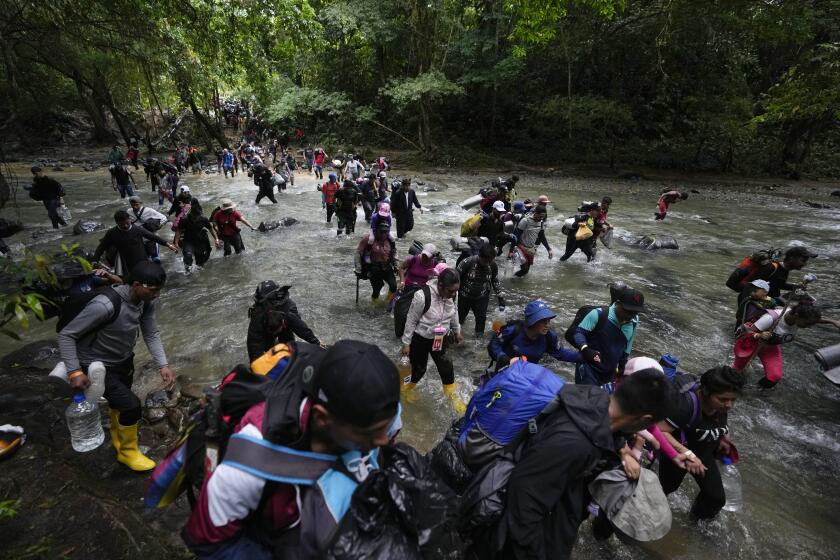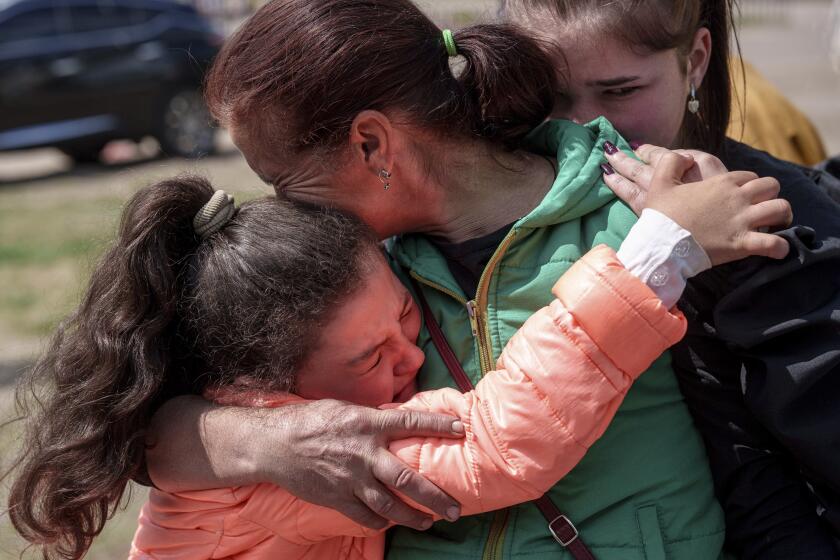Migrants Are Told Plan Is Sensible
Officials in Orange County are trying to allay fears that new efforts to crack down on illegal immigrants will stigmatize and frighten Latinos and other minorities.
“We are not going to be doing sweeps,” Costa Mesa Police Chief John D. Hensley told dozens of Latino community leaders in Santa Ana on Wednesday. “We are not going to be squeezing employers.... That is just not going to happen.”
Orange County Sheriff Michael S. Carona had a similar message at the meeting: “We are only targeting the worst of the worst. We are trying to take people off the streets that will do nothing to enhance the overall quality of our community.”
Concerns of immigrant advocates and Latino groups have mounted in recent months as opponents of illegal immigration press their campaign for more local enforcement of immigration laws in Southern California.
The city of Costa Mesa recently asked the federal government to train city police to be immigration officers, just as Carona has proposed for his deputies.
Costa Mesa is believed to be the first city in the nation to have its police enforce federal immigration laws. The Sheriff’s Department would join those in Los Angeles and San Bernardino counties, as well as counties in Florida, Alabama and Arizona. These counties have already signed memorandums of understanding with the federal government to train local authorities in law enforcement.
The Sheriff’s Department has submitted to U.S. Immigration and Customs Enforcement a plan to train deputies in immigration law. Once approved by the federal government, the county Board of Supervisors would decide whether to enter into an agreement with the federal government to make sheriff’s deputies federal immigration officers.
Federal approval should come soon and consideration by county supervisors could happen within a month, said Jon Fleischman, a spokesman for the sheriff.
The proposal would give deputies access to federal databases to determine prior offenses of suspects. It would also allow deputies to determine the immigration status of suspected felons. Currently, that status can be checked only if a suspect is in custody.
The explanations are not well understood or accepted among Latinos, some community leaders say.
“There’s increasing tension,” said Amin David, who heads Los Amigos of Orange County, a civic group that meets to discuss Latino issues. “The chill factor is already in the works and nothing has even happened yet. There’s not even a plan in place. The Costa Mesa community is already in great fear.”
Immigrant rights advocates say local authorities should not have the right to enforce federal law because it could increase racial profiling.
One such advocate -- Nativo V. Lopez, who heads the assistance group Hermandad Mexicana and who rarely appears at a forum with Carona -- said during the event that giving local authorities immigration enforcement power is “unreasonable, racist public policy.” He called on Latinos to boycott stores in Costa Mesa and not cooperate with police. He said he would lead a march and rally in the city on Presidents Day weekend in February.
That event would come after several months of meetings about Costa Mesa’s policy and several demonstrations. On Tuesday night, immigrant advocates and anti-illegal immigrant activists sparred at a Costa Mesa City Council meeting, where they addressed the council about its recent decision.
Also Tuesday night, Costa Mesa Chief Hensley met with a group, made up primarily of mothers, in a neighborhood housing many immigrants to explain the policy. The policy would not go into effect for a year, he pointed out, since an agreement with the federal government must first be signed and then local officers trained.
Once the sheriff’s agreement with the federal government was approved, supervisors would consider it. Carona has proposed that training be provided for 200 deputies, although only “a few dozen” would get the training to start, Fleischman said.
On Wednesday, Carona provided the most specifics so far.
Under the new policy, only a previously deported and undocumented immigrant who was stopped on suspicion of a felony could be held and prosecuted for the federal crime of re-entering the country. The suspect could be convicted and serve jail time, Carona said, even if there were not enough evidence to charge the person with the original suspected felony.
Costa Mesa, while not limiting itself to targeting previously deported suspects, is putting a priority on undocumented gang members.
John Trasvina, an attorney for the Mexican American Legal Defense and Education Fund, said the policy was unnecessary because existing procedures can lead to deportation of undocumented immigrants after they are sentenced. Picking up suspects in state crimes and then charging them with federal crimes “short-circuits” the justice system, he said.
He and others said they fear the policy would deter immigrants from reporting crimes. They added that future sheriffs could use the policy in a different way than Carona has promised. Hensley said he wants to use the policy in felonies except domestic violence because he doesn’t want to deter reporting.
Supervisor Lou Correa said he would suspend judgment until he sees the plan come before his board for a vote.
“I do not believe this is targeted at Mexicans or Latinos,” he said. “This is about public safety. I do have concerns, though. I think we have to make sure it stays in the realm of public safety.”
More to Read
Start your day right
Sign up for Essential California for news, features and recommendations from the L.A. Times and beyond in your inbox six days a week.
You may occasionally receive promotional content from the Los Angeles Times.






